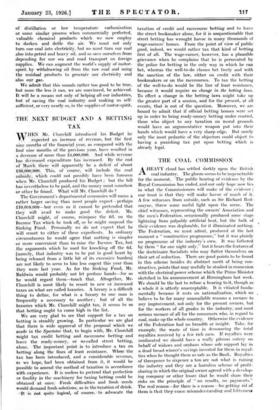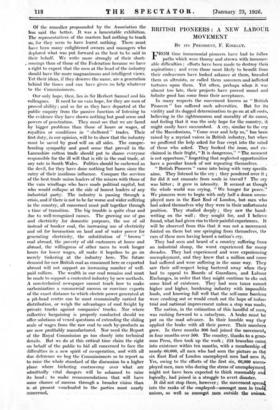THE COAL COMMISSION
A HEAVY cloud has settled darkly upon the British coal industry. The gloom seems to be impenetrable for the moment. The public hearing of evidence by the Royal Commission has ended, and our only hope now lies in what the Commissioners will make of the evidence ; our trust is that they will make havoc of much of it. A few witnesses from outside, such as Sir Richard Red- mayne, threw some useful light upon the scene. The chief witnesses, representing the owners' Association and the men's Federation, occasionally produced some stage lightning from palpably artificial heat, but the bulk of their evidence was deplorable, for it illuminated nothing. The Federation, we must- admit, produced at the last moment a " constructive programme," but it was plainly no programme of the industry's own. It was fathered by them " for one night only," but it bears the features of the doctrinaire Socialists who may flatter themselves on their art of seduction. There are good points to be found in this scheme besides its abstract merit of being con- structive, points that may usefully be studied in connexion with the electrical power scheme which the Prime Minister sketched in his announcement at Birmingham last week. We should be the last to refuse a hearing to it, though as a whole it is utterly unacceptable. It is vitiated funda- mentally because it rests on nationalization, which we believe to be for many unassailable reasons a menace to any improvement, not only for the present owners, but for the workers of all grades in the industry, and most serious menace of all for the consumers who, in regard to coal, make up the whole country. Otherwise the evidence of the Federation had no breadth or insight. Take, for example, the waste of time in denouncing the total royalties received by a few rich men. If royalties were confiscated we should have a really piteous outcry on behalf of widows and orphans whose sole support lay in a dead bread-winner's savings invested for them in royal- ties when he thought them as safe as the Bank. Royalties of threepence to sixpence a ton are not what is ruining the industry and they are a harmless scheme of profit- sharing in which the original owner agreed with a develop- ing company or other lessee that he would share their risks on the principle of " no ,results, no payments." The real reason—for there is a reason--for. getting rid of them is-that they cause misunderstanding andhitternesa Of the remedies propounded by the Association the less said the better. It was a lamentable exhibition. The representatives of the masters had nothing to teach us, for they seem to have learnt nothing. There must have been many enlightened owners and managers who deplored what was put forward as the best to be said in their behalf. We write more strongly of their short- , .comings than of those of the Federation because we have a right to expect that the men at the head of the industry should have the more magnanimous and intelligent views. Yet their ideas, if they deserve the name, are a generation _behind the times and can have given no help whatever to the Commissioners.
Our only hope, then, lies in Sir Herbert Samuel and his colleagues. It need be no vain hope, for they are men of proved ability ; and so far as they have departed at the public enquiry from the passive function of listening to the evidence they have shown nothing but good sense and powers of penetration. They must see that we are faced by bigger problems than those of hours or wages, of royalties or conditions in " sheltered " trades. Their first duty, in our opinion, will be to show that the industry must be saved by good will on all sides. The compre- hending sympathy and good sense that prevail in the Lancashire cotton trade should put to shame everyone responsible for the ill will that is rife in the coal trade, at any rate in South Wales. Politics should be eschewed as the devil, for they have done nothing but harm since the entry of their insidious influence. Compare the services of the best trade union leaders of the miners with those of the vain windbags who have made political capital, but who would collapse at the side of honest leaders of any industrial party. The industry is passing through a crisis, and if there is not to be far worse and wider suffering in the country, all concerned must- pull together through a time of transition. The big trouble is quite clear and due to well-recognized causes. The growing use of gas and electricity for domestic purposes, the use of oil instead of bunker coal, the increasing use of electricity and oil for locomotion on land and of water power for generating electricity, the substitution of " brown" coal abroad, the poverty of old customers at home and abroad, the willingness of other races to work longer hours for lower wages, all make it hopeless to go on merely tinkering at the industry here. The future demand for raw British coal as consumed here or exported abroad will not support an increasing number of well- paid colliers. The wealth in our coal remains and must be made to support a contented industry by new methods. A non-technical newspaper cannot teach how to make carbonization a commercial success or convince experts of the exact distance to which electric power generated at a pit-head centre can be most economically carried for distribution, or weigh the advantages of coal freight by private trucks against companies' trucks. Nor -where collective bargaining is properly conducted should we offer solutions of vexed questions of extending the sliding scale of wages from the raw coal to such by-products as are now profitably manufactured. Nor need the Report of the Royal. Commission go too closely into technical details. But we do at this critical time claim the right on behalf of the public to bid all concerned to face the difficulties in a. new spirit of co-operation, and with all due deference we beg the Commissioners so to report as to raise the whole standard of the discussion to a higher plane where bickering controversy over what are admittedly vital dangers will be ashamed to raise its head ; to make recommendations that will have some chance of success through a broader vision than is at present vouchsafed to the parties most nearly concerned.











































 Previous page
Previous page